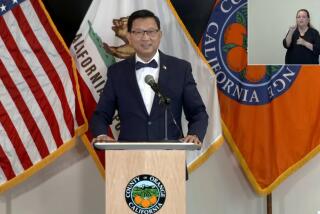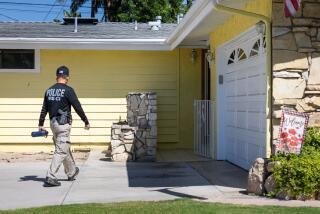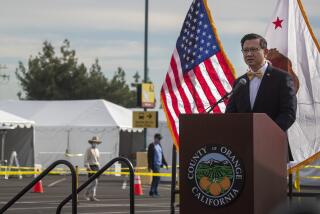Van de Kamp Reportedly Rules Against Prosecuting Controller
SACRAMENTO — State Atty. Gen. John K. Van de Kamp has concluded that state Controller Gray Davis improperly used public employees and resources in his successful 1986 election bid, but the attorney general has decided to accept a cash settlement rather than prosecute his fellow Democrat, according to sources familiar with the probe.
The Davis campaign committee this week sent the Assembly Rules Committee a check for $10,000 to cover the “inadvertent use of legislative facilities” for non-legislative purposes, according to Bob Connelly, the Assembly’s chief administrative officer. It is the fourth such payment since the attorney general’s investigation began in March, 1987, bringing the total amount repaid to the state to $28,000.
The checks apparently cover expenses improperly billed to the state during a time when Davis was a Southern California assemblyman and a candidate for controller.
It is not known if the money Davis has paid the committee is included in the final settlement. The sources did not reveal the final amount of the civil settlement or any of the details of Van de Kamp’s investigative report, which is expected to be released later this month.
Generally, courts have held that the use of state employees or facilities for election purposes, if deliberate, can be prosecuted as a violation of California’s century-old public embezzlement law.
Davis has repeatedly denied any knowledge of improper use of public resources by his staff. “The rules in my office regarding separation of campaign and state staff duties were explicit,” Davis said a year ago after The Times reported his use of public resources for political campaigning. “It was made very clear to staff that no campaign business was to be conducted on state time.”
The controller also pointed out that he had paid the Assembly Rules Committee checks totaling $2,126 during 1985 and 1986 to cover any non-state expenditures if “any individual failed to observe the rules.”
In recent months, Davis has refused to comment on any of the allegations pending the outcome of Van de Kamp’s investigation.
The attorney general’s decision to investigate another statewide officeholder was a politically sensitive one because Van de Kamp and Davis are widely viewed as rivals for the Democratic nomination for governor in 1990.
A prosecution could have damaged Davis’ prospects, but could have also tarnished Van de Kamp as well, if it was seen as politically motivated.
In most cases, charges that an official used public employees and facilities for election purposes would be prosecuted by a local district attorney, not by the state attorney general.
Los Angeles County Dist. Atty. Ira Reiner and Sacramento County Dist. Atty. John A. Dougherty decided not to pursue the case.
Reiner cited “the appearance of a conflict of interest” when he declined to take over the case earlier this year. A spokesman said a former Reiner campaign aide had worked with Davis. Reiner is a Democrat.
Dougherty, also a Democrat, rejected the case twice, in February and again in August, both times because almost all of the 15 to 20 potential witnesses were in Los Angeles. “I did not comment on whether it was a winnable case or not,” Dougherty said in a recent interview. “We simply said it was a question of technical jurisdiction and that it should be Los Angeles.”
Van de Kamp launched his investigation after a Times story on allegations that Davis had set up a bank of state phones in a public building in an effort to raise money to erase a $900,000 campaign deficit after his election as controller in November, 1986.
Records showed that the phones were used repeatedly to place calls to his campaign headquarters, his San Francisco-based fund-raising consultant, major campaign contributors and political professionals across the country.
However, the attorney general’s investigators soon shifted their attention to the campaign itself, when a number of Davis’ Assembly staff members began working to elect Davis to statewide office.
Several former Davis employees told The Times that they and others worked on Davis campaigns virtually full time while on the state payroll. One Assembly staff member, for example, used a state computer during working hours to produce hundreds of fund-raising letters, the former employees said. Another Assembly staff member regularly worked on Davis’ campaign fund-raising records in his Beverly Hills district office, the former employees said.
More to Read
Get the L.A. Times Politics newsletter
Deeply reported insights into legislation, politics and policy from Sacramento, Washington and beyond. In your inbox three times per week.
You may occasionally receive promotional content from the Los Angeles Times.










